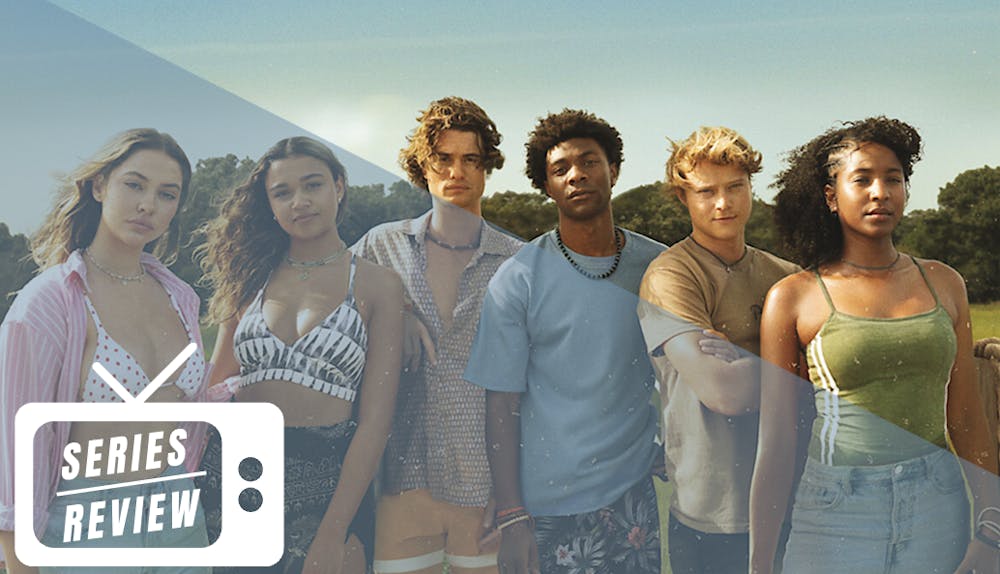Six teens, a chain of islands and some hidden treasure. What could go wrong?
The series “Outer Banks” (2020) released episodes from its latest season in two parts, with the first five episodes dropping on Oct. 10 and the final five episodes on Nov. 7. The show follows a group of six friends who seek hidden treasure while living in Outer Banks, N.C. Season one grapples with John B. Routledge (Chase Stokes) wanting to carry on his father’s legacy of treasure hunting. Three seasons later, the friend group is searching for Blackbeard’s Blue Crown, a fictional artifact to grant wishes. At the same time, they are fighting to keep their land from the government, eventually leading to the Outer Banks police chasing them.
The season starts strong as the friend group unites and establishes a local surf shop built on land they purchased after obtaining gold in season three. John B, JJ Maybank (Rudy Pankow), Sarah Cameron (Madelyn Cline), Kiara Carrera (Madison Bailey), Pope Heyward (Jonathan Daviss) and Cleo Anderson (Carlacia Grant) have a joint account balance of over $1 million from their previous adventures, raising the question of what will come next.
However, in season four, the series loses its cohesiveness. Instead of the group hunting treasure for their monetary needs, they embark on the adventure on behalf of JJ’s grandfather, who sought the treasure himself. Although the storyline adds a sentimental touch, the new purpose reduces the stakes for all characters.
Side plots also ruin the season’s flow. In past seasons, they were directly related to the main characters, making them engaging. But with season four’s main side plot between minor characters such as Rafe Cameron (Drew Starkey), Hollis Robinson (Brianna Brown) and Chandler Groff (J. Anthony Crane), it wasn’t as emotional since it was separate from the main group.
Although the class divide between the Pogues — the name for the poorer group that includes John B and JJ — and the Kooks, the name for the wealthy, has been prevalent in the show’s previous seasons, the town's reactions of anger and injustice towards the rich claiming the pogues’ land felt overdone.
Season four also ruins the character development built in previous seasons. For instance, JJ wastes the money that the group gained during the previous seasons, counteracting all of his character growth. JJ’s character has always been complex, impulsive and erratic, with a slight drinking problem. Season one revealed that his adoptive dad was abusive and season four revealed a greater secret about his biological dad. In prior seasons, JJ made the same mistakes, overspending and getting into trouble, but eventually learned to open himself up to the group and clean up his act. Seeing him take steps back is disappointing, as his initial character growth provided an engaging plot-line that kept viewers engaged. His deterioration made the season less enjoyable.
Throughout the season, countless pointless crimes were committed, mainly by JJ but occasionally by the entire group, like hiding a body, theft and assault. In season one, the Pogues were often outrunning the cops, not because of crimes that they had committed but rather ones they were framed for. Now, the same sentiment of the Pogues’ innocence is perpetuated, despite them actually committing various crimes. Therefore, the Pogues’ standing as the good guys in the story is questioned, making it harder to root for the main characters.
Episode 10, the season’s finale, encapsulated the lack of realism in the series. The Pogues and Rafe find themselves stranded in Morocco after their boat gets shipwrecked, both looking for a murderer and treasure. What’s even more unrealistic is a sheriff sails to Morocco to find JJ and his friends, despite warrants out for their arrest. This unbelievable storyline distracts viewers from the show, making it easy to focus on how ridiculous the plot is rather than enjoy the viewing experience.
Additionally, the visuals of the season finale made the show very frustrating to watch. Most of the episode is in the middle of a sandstorm, which heavily obscures the characters. When the treasure is finally found, the moment isn’t gratifying because the poor visibility makes it difficult to see what happens, let alone know who found it.
“Outer Banks” season four consisted of reused plot lines, unnecessary chaos and a very unrealistic relationship with the law, perfectly illustrating that sometimes, three seasons of a show is enough. The show was more frustrating than interesting, not in a way that provided tension and suspense, but in a way that made it challenging to finish. While the concept for season four had potential, the execution failed drastically.

Amelia Bush (she/her) (28C) is majoring in English. She is from Minneapolis, Minnesota, and enjoys walking around their many lakes. Outside of the Wheel, you can find her reading, scrapbooking, or playing tennis.






